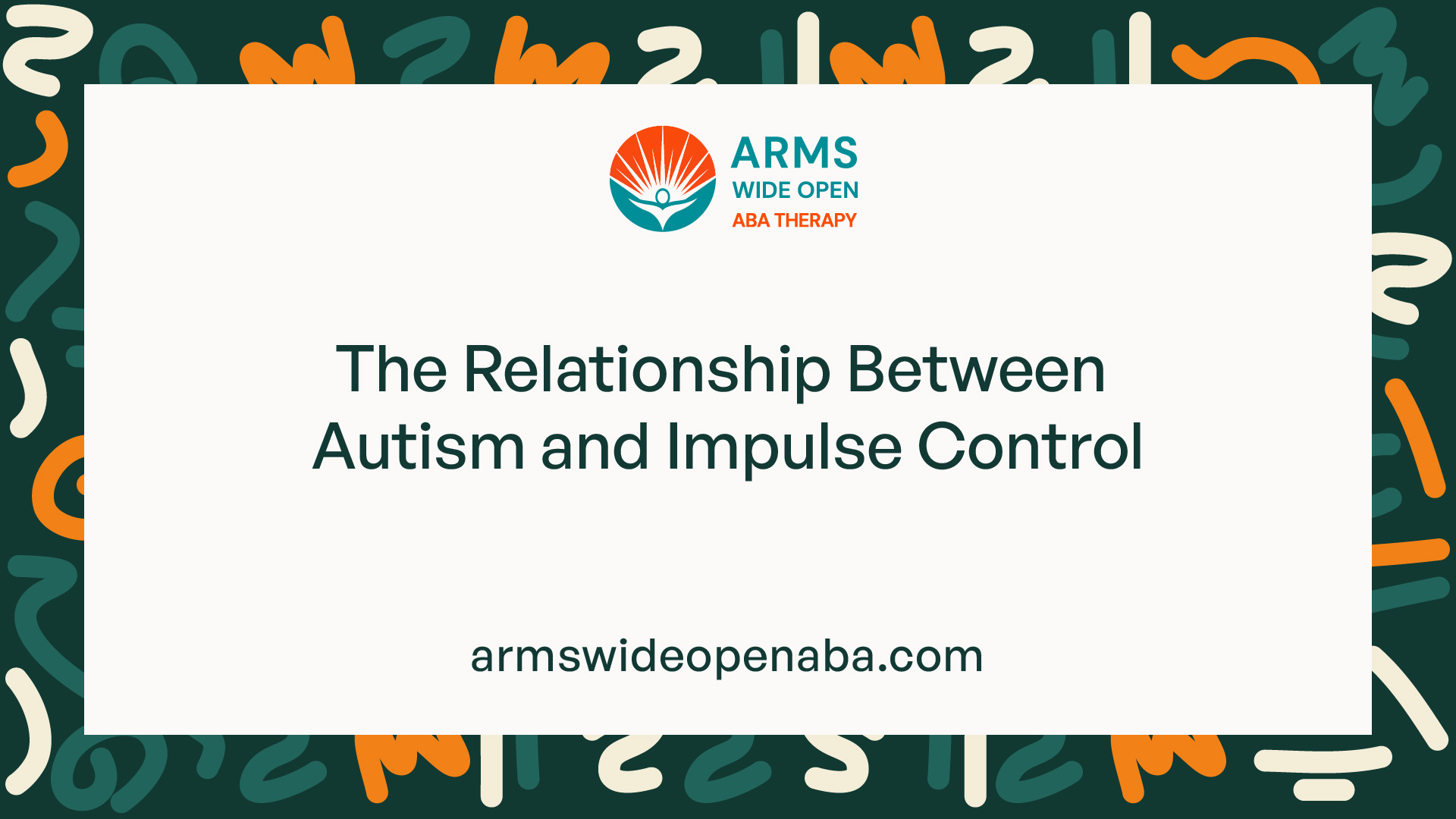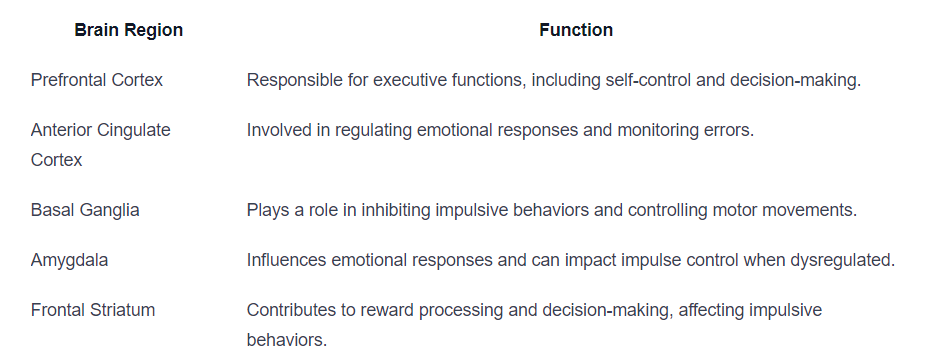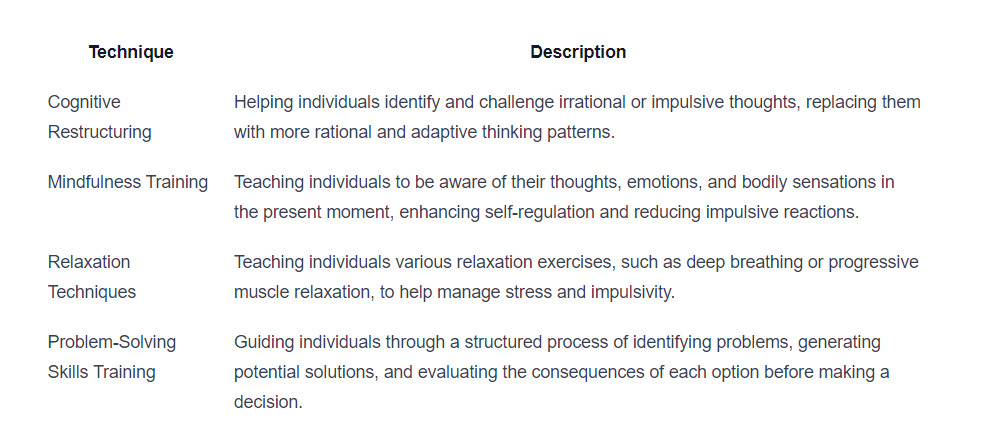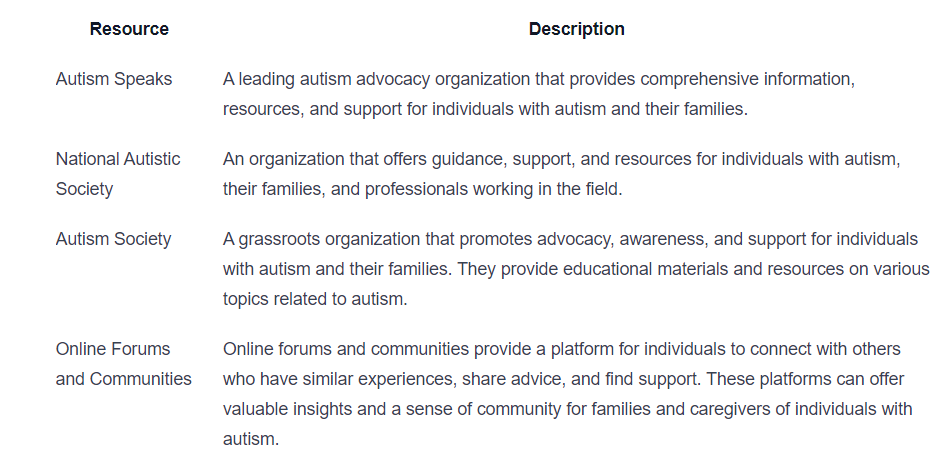The Relationship Between Autism and Impulse Control
Unveiling the complex relationship between autism and impulse control. Discover the implications, neurological insights, and strategies for support.

Understanding Autism and Impulse Control
To comprehend the intricate relationship between autism and impulse control, it is essential to have a clear understanding of autism spectrum disorder (ASD) and impulse control itself.

Overview of Autism Spectrum Disorder
Autism spectrum disorder is a developmental disorder that affects a person's social communication and interaction skills. Individuals with ASD often display repetitive behaviors and have specific interests. ASD is a spectrum disorder, meaning that it varies in severity and can present differently in each individual.
Autism spectrum disorder is characterized by challenges in social interaction, communication, and restricted or repetitive patterns of behavior. It is a lifelong condition that typically emerges in early childhood and continues throughout a person's life. While the exact causes of ASD are still being studied, it is believed to involve a combination of genetic and environmental factors.
What is Impulse Control?
Impulse control refers to the ability to manage and regulate one's immediate reactions and behaviors in response to internal or external stimuli. It involves the ability to think before acting, resist impulses, and make thoughtful decisions. Impulse control plays a crucial role in self-control, emotional regulation, and the ability to delay gratification.
Individuals with strong impulse control can effectively manage their behaviors, emotions, and desires, adapting them to fit social norms and expectations. However, for some individuals, such as those with autism, impulse control challenges may arise.
Understanding the relationship between autism and impulse control is vital in order to provide appropriate support and strategies to individuals on the autism spectrum. By exploring the challenges faced by individuals with autism in managing their impulses and the factors that influence impulse control, we can gain insight into how to best help and support them.
The Connection Between Autism and Impulse Control
Understanding the relationship between autism and impulse control is crucial for individuals with autism spectrum disorder (ASD) and those who support them. Impulse control challenges can significantly impact daily life and social interactions. Let's explore the specific difficulties individuals with autism face when it comes to impulse control and the factors that influence their ability to regulate their impulses.
Impulse Control Challenges in Autism
Impulse control refers to the ability to resist immediate urges or temptations in favor of more appropriate and socially acceptable behaviors. It involves inhibiting impulsive actions, thoughts, and emotions. Individuals with autism often experience difficulties in this area.
Some common impulse control challenges observed in individuals with autism include:
- Impulsive behaviors: Individuals with autism may engage in impulsive actions without considering the consequences. This can manifest as difficulty waiting their turn, interrupting others, or engaging in repetitive or self-stimulatory behaviors.
- Emotional regulation: Autism can be associated with difficulties in managing and regulating emotions. This can lead to impulsive outbursts or meltdowns when emotions become overwhelming.
- Difficulty with social cues: Individuals with autism may struggle to interpret social cues accurately. This can result in impulsive responses or inappropriate behaviors in social situations.
Factors Influencing Impulse Control in Individuals with Autism
Several factors contribute to the challenges individuals with autism face in managing impulse control. These factors can vary from person to person, but they play a significant role in understanding the complexity of the relationship between autism and impulse control.
Factors Influencing Impulse Control in Autism
Sensory Processing Differences
Executive Functioning Deficits
Communication Difficulties
Cognitive Rigidity
Anxiety and Stress
Co-occurring Conditions (ADHD, OCD, etc.)
- Sensory Processing Differences: Individuals with autism often experience sensory processing differences, which can impact their ability to regulate their responses to sensory stimuli. This can lead to impulsive reactions or seeking sensory stimulation in inappropriate ways.
- Executive Functioning Deficits: Executive functioning refers to a set of cognitive processes responsible for planning, organizing, and self-control. Difficulties in executive functioning, commonly seen in individuals with autism, can affect impulse control.
- Communication Difficulties: Language and communication challenges can contribute to impulse control difficulties. Difficulties in expressing needs, understanding instructions, or engaging in effective communication can result in impulsive behaviors.
- Cognitive Rigidity: Autism is often associated with cognitive rigidity, which refers to inflexible thinking and difficulty adapting to changes. This rigidity can impact impulse control as individuals may struggle to consider alternative responses or solutions.
- Anxiety and Stress: Anxiety and stress are common in individuals with autism. These emotional states can impair impulse control, as heightened anxiety or stress levels can lead to impulsive behaviors as a coping mechanism.
- Co-occurring Conditions: Individuals with autism may have co-occurring conditions such as attention-deficit/hyperactivity disorder (ADHD) or obsessive-compulsive disorder (OCD). These conditions can further impact impulse control.
Understanding the challenges individuals with autism face in managing impulse control and recognizing the factors that influence their ability to regulate impulses is essential. By addressing these challenges and providing appropriate support, individuals with autism can develop strategies to improve their impulse control skills and enhance their overall quality of life.
Impact on Daily Life
Living with autism and experiencing challenges with impulse control can have significant implications for individuals and their daily lives. It's important to understand these implications and explore strategies for managing impulse control in the context of autism.
Implications of Impulse Control Issues
Impulse control issues can manifest in various ways for individuals with autism. These challenges can impact several aspects of daily life, including:
- Social Interactions: Difficulties with impulse control can affect social interactions, making it harder for individuals with autism to navigate social situations appropriately. They may struggle with interrupting others, blurting out inappropriate comments, or invading personal space, which can lead to misunderstandings and strained relationships.
- Safety Concerns: Impulse control issues can also pose safety risks for individuals with autism. They may engage in impulsive behaviors without considering potential dangers, such as running into traffic or touching hot objects. This puts them at a higher risk of accidents and injuries.
- Academic Performance: In a school setting, impulsivity can interfere with learning and academic performance. Students with autism may have difficulty staying focused, following instructions, and completing tasks due to impulsive actions or thoughts.
- Emotional Well-being: Impulse control challenges may contribute to emotional dysregulation and difficulty managing emotions effectively. Individuals with autism may experience frustration, anger, or anxiety when they struggle to control their impulses, leading to increased emotional distress.
Strategies for Managing Impulse Control in Autism
While impulse control issues can present unique challenges, there are strategies that can help individuals with autism effectively manage these difficulties. Here are some approaches that have shown promise:
- Structured Environment: Providing a structured and predictable environment can help individuals with autism anticipate and prepare for situations where impulse control may be challenging. Consistent routines, visual schedules, and clear expectations can promote self-regulation.
- Visual Supports: Visual supports, such as visual cues, charts, and timers, can assist individuals with autism in understanding and managing their impulses. These tools can help them visualize the passage of time, make decisions, and regulate their behavior more effectively.
- Social Skills Training: Teaching and practicing social skills can enhance impulse control in social settings. This can include strategies such as taking turns, active listening, and using appropriate body language. Social skills training can provide individuals with autism with the tools and strategies needed to navigate social interactions successfully.
- Cognitive-Behavioral Techniques: Cognitive-behavioral therapy (CBT) can be beneficial for individuals with autism and impulse control challenges. CBT helps individuals identify and challenge impulsive thoughts, develop coping strategies, and regulate emotions more effectively.
- Supportive Interventions: Applied behavioral analysis (ABA) techniques can be utilized to address impulse control issues in individuals with autism. ABA focuses on reinforcing positive behaviors while reducing impulsive actions through various behavior modification strategies.
By implementing these strategies and providing appropriate support, individuals with autism can develop essential skills to manage their impulse control challenges and lead more fulfilling lives. It's important to tailor the interventions to each individual's unique needs and strengths, considering their specific goals and circumstances.
Neurological Perspectives
Understanding the neurological aspects of the relationship between autism and impulse control can provide valuable insights into this complex connection. In this section, we will explore the brain regions involved in impulse control and the neurological mechanisms that contribute to impulse control issues in individuals with autism.
Brain Regions Involved in Impulse Control
Impulse control is a complex cognitive function that relies on the coordination of various brain regions. In individuals with autism, there may be differences in the development and functioning of these brain regions, leading to challenges in impulse control.

The intricate interplay between these brain regions is essential for effective impulse control. Any disruptions or abnormalities in their functioning can contribute to impulse control challenges observed in individuals with autism.
Neurological Mechanisms in Autism and Impulse Control
The neurological mechanisms underlying impulse control issues in individuals with autism are complex and multifaceted. While the exact mechanisms are still being studied, several factors have been identified as potential contributors.
- Neural Connectivity: Individuals with autism may exhibit atypical neural connectivity between the brain regions involved in impulse control. This altered connectivity can affect information processing and coordination, leading to difficulties in regulating impulsive behaviors.
- Neurotransmitter Imbalance: Imbalances in neurotransmitters, such as dopamine and serotonin, have been implicated in both autism and impulse control disorders. These imbalances can disrupt the normal functioning of the brain circuits involved in impulse control.
- Sensory Processing Differences: Many individuals with autism experience sensory processing differences, which can impact their ability to regulate impulses. Heightened or diminished sensory sensitivities may contribute to impulsive behaviors as individuals seek sensory stimulation or struggle to filter sensory information effectively.
- Executive Function Deficits: Executive functions, such as planning, problem-solving, and inhibitory control, are often impaired in individuals with autism. These deficits can affect impulse control by making it challenging to anticipate consequences, inhibit impulsive responses, and consider alternative actions.
Understanding the neurological perspectives of autism and impulse control provides valuable insights into the underlying mechanisms involved. However, it is essential to note that the relationship between autism and impulse control is complex and influenced by various individual factors. Further research is needed to deepen our understanding and develop effective interventions to support individuals with autism in managing impulse control challenges.
Behavioral Interventions
When it comes to managing impulse control issues in individuals with autism, behavioral interventions play a crucial role. These interventions aim to address and improve impulse control through targeted techniques and therapies. Two commonly used approaches are Applied Behavioral Analysis (ABA) techniques and Cognitive Behavioral Therapy (CBT) approaches.
Applied Behavioral Analysis (ABA) Techniques
Applied Behavioral Analysis (ABA) is a well-established therapeutic approach that focuses on understanding and modifying behavior patterns. It is widely used in the treatment of autism and has shown promising results in addressing impulse control challenges.
ABA techniques for managing impulse control in individuals with autism involve breaking down behaviors into smaller components and systematically reinforcing desired behaviors while discouraging unwanted behaviors. This approach utilizes positive reinforcement, prompting, and shaping techniques to teach individuals with autism alternative and more appropriate responses to impulsive behaviors.
Some specific ABA techniques used to address impulse control in autism include:

Cognitive Behavioral Therapy (CBT) Approaches
Cognitive Behavioral Therapy (CBT) is a widely recognized therapeutic approach that focuses on identifying and modifying thought patterns and behaviors. While originally developed for individuals with mental health conditions, CBT has shown effectiveness in addressing impulse control challenges in individuals with autism.
CBT approaches for managing impulse control in autism involve helping individuals recognize and challenge impulsive thoughts and behaviors. By identifying triggers and learning coping strategies, individuals can develop healthier responses to impulsive urges.
Some specific CBT techniques used to address impulse control in autism include:

Both ABA techniques and CBT approaches offer valuable tools and strategies for managing impulse control issues in individuals with autism. The choice of intervention depends on individual needs, preferences, and the expertise of the professionals involved. It is important to consult with qualified therapists or practitioners to determine the most suitable approach for each individual's unique circumstances.
Support and Resources
Individuals with autism and their families may benefit from accessing various support services and resources that are available to assist them in managing impulse control challenges. These services and resources aim to provide guidance, assistance, and a network of support for individuals with autism and their loved ones.
Support Services for Individuals with Autism
Support services for individuals with autism encompass a wide range of professionals and organizations dedicated to helping individuals navigate the challenges associated with impulse control and other aspects of autism. These services may include:
- Autism Support Groups: These groups bring together individuals with autism to share experiences, offer emotional support, and exchange strategies for managing impulse control challenges.
- Behavioral Therapists: Behavioral therapists specialize in working with individuals with autism to develop strategies and interventions to address impulse control issues and promote positive behavior.
- Occupational Therapists: Occupational therapists focus on developing skills and techniques to enhance daily functioning and self-regulation, which can aid in managing impulse control challenges.
- Speech and Language Therapists: These therapists assist individuals with autism in improving communication skills, which can contribute to better self-expression and understanding of impulse control.
- Special Education Teachers: Special education teachers provide tailored instruction and support to individuals with autism, including strategies to manage impulse control challenges in educational settings.
Resources for Families and Caregivers of Individuals with Autism
Families and caregivers of individuals with autism can access a wealth of resources to help them understand and address impulse control challenges. These resources offer information, education, and practical strategies to support individuals on the autism spectrum. Some valuable resources include:

These support services and resources can be invaluable in helping individuals with autism and their families navigate and manage impulse control challenges. By seeking support and utilizing available resources, individuals with autism can enhance their overall well-being and improve their ability to cope with impulse control difficulties.
Sources
https://www.crossrivertherapy.com/autism/autism-and-impulse-control
https://carmenbpingree.com/blog/the-relationship-between-autism-and-impulse-control/
Similar articles
We’re here to help you

Our team is here to assist you in this process. Contact us for any assistance.
it’s easy to apply
We Accept Most Insurances
Our in-network insurance partnerships make ABA therapy more accessible to families throughout our service areas.







Our Insurance Process
We'll request your insurance details to help us verify your plan's coverage for ABA therapy. Once we've received this information, we'll walk you through your benefits, including copayments, deductibles and out-of-pocket maximums, so you know what to expect in advance.
Our team will then handle the preauthorization and all the necessary paperwork.
.svg)





















.jpeg)


































.jpeg)




.jpeg)







.jpeg)











.jpeg)
















